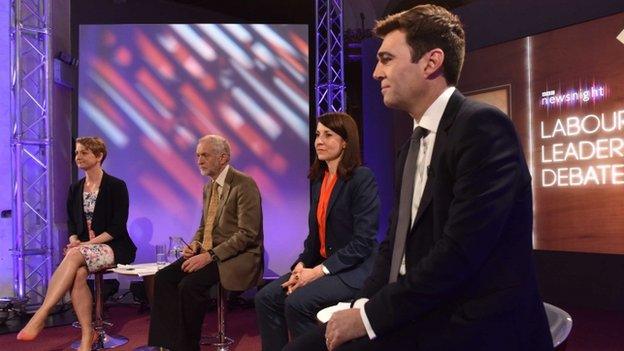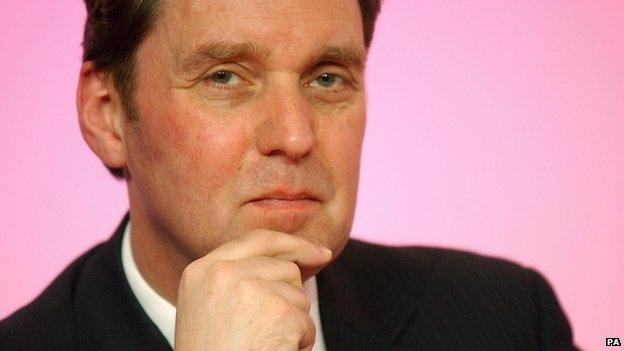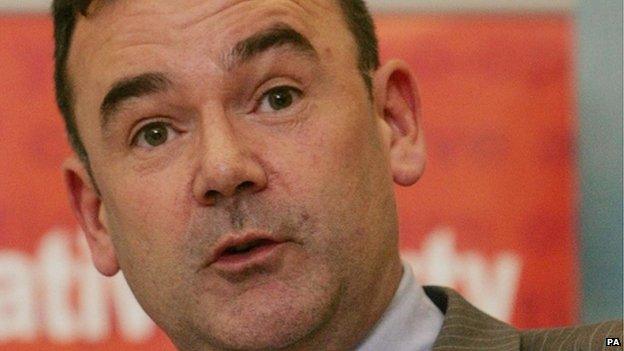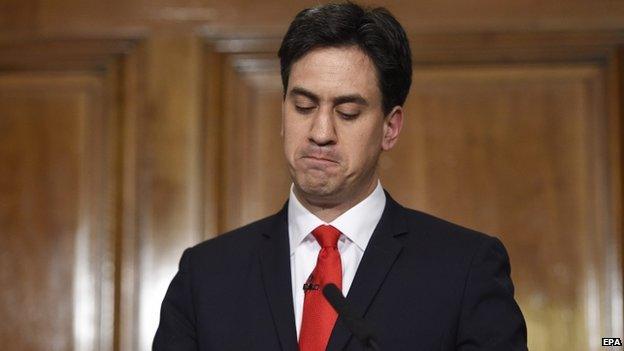Two years to save the Labour Party?
- Published

The new leader of the Labour Party will be announced in September
The four candidates for the Labour leadership have faced questioning from fellow MPs, MEPS, trade unionists, rank and file activists and members of the public at a series of hustings over the past few weeks.
Some commentators have criticised them for not presenting enough new ideas or facing up to the scale of Labour's general election defeat.
The same accusation could not be levelled at two men who were, at various times, close to Tony Blair: Alan Millburn, who as well being a minister under the former leader had a key role in the 2005 election campaign; and Jon Cruddas, who had worked in Number 10 under Blair but, in his role liaising with the trade unions, was somehow never seen as 'Blairite'.
Today, fielding questions at an event hosted by the left-of-centre IPPR think tank, Mr Cruddas quoted an unnamed party official as saying there were "two years to save the Labour Party".
That comment acknowledged the scale of Labour's defeat, Mr Cruddas said, adding that "things don't look that healthy for the Labour Party at the moment".
Meanwhile, Mr Milburn - speaking to centre-right think tank the Centre for Social Justice - said it would be a "tall order" for Labour to win in 2020 and that the last election was fought "with the wrong leader and the wrong approach".
Their potential solutions - though not mutually exclusive - were different in tone.

Mr Milburn said Labour gifted the Tories an open goal by ditching, not defending its record
Mr Millburn denounced the "obsession" under Ed Miliband with the top 2% - who would pay a so-called 'mansion tax' on properties over £2m - and the bottom 8% who would benefit from a reform of zero hours contracts.
He said he was astonished that a more aspirational agenda had not been formulated and that related issues of education and social mobility did not form a key part of Labour's election campaign.
'English Labour Party'
Meanwhile, Mr Cruddas suggested the term "aspirational" was a euphemism for "middle-class" and that in fact, even more worryingly, Labour "had lost everywhere, to everyone".
He said support amongst working class voters had contracted substantially and cited evidence from MORI polls which suggested three quarters of the supporters the party has lost since 1997 were working class.
For him, Labour faced the challenge of being distinctive in an era when there was less money to spend and advocated devolving more power and control to "city-regions" outside London and local communities. He said the SNP's centralisation of power at Holyrood should be challenged by the beleaguered Labour Party in Scotland.
Labour had to face up to the politics of identity, he went on, saying that in the next month MPs and councillors would unveil plans for an English Labour Party.
Initially this would be a "ginger group" but he hoped it would develop into "a very significant new part of the Labour infrastructure".

Mr Cruddas said an "English Labour Party" would be launched soon
Mr Cruddas told me: "On the question of whether it should be put in rules, as is the Welsh and Scottish Labour Party, it seems to me that's where we will end up, or we should do."
Back to Mr Milburn, who argued that Labour shouldn't "wonk" its way back to power. While he was interested in policy development, more important were three "other 'Ps' - personality, purpose and positioning".
Labour needed attractive, brave leadership that sounded in touch with its voters, to define what it stood for, and to reclaim the centre ground and not be pushed to the left, he said.
The party's perhaps misleadingly good showing in the polls ahead of the election had potentially forced those with doubts about its leader or its policies in to the Tory fold in 2015, Mr Milburn added.
'Ran out of road'
Although in charge of Labour's policy review ahead of the last election, Mr Cruddas agreed that Labour must now address what its purpose was - and that the party's "sentiment" might be more important than its policy offer.
His party had broadened its appeal by rebranding as "One Nation Labour" midway through the last Parliament. A similar tack proved successful for the former leader of the Australian Labour Party, Paul Keating, he noted.
But as the election approached, this was narrowed into a series of "retail offers", such as the energy price freeze, or getting rid of what Labour dubs the "bedroom tax" - an approach characterised and criticised by the US strategist David Axelrod as "vote Labour, win a microwave", he said.

Mr Miliband resigned after Labour's election defeat, which saw the party virtually wiped out in Scotland
Mr Cruddas explained that Labour's internal polling could be open to contradictory interpretations. So as Labour appeared to be head-to-head with the Conservatives and the party was being told it could not possibly poll less than 35%, there was no incentive to move away from the retail offers for fear of alienating support.
'Labour gambled'
But on an issue-by-issue basis - on welfare, on immigration, on the economy, for example - the party was consistently behind.
Increasingly there were separate policy meetings - at which a broader approach was being advocated - and strategy meetings, which tended to conclude a "narrow, targeted" approach was best. These competing views were never reconciled, Mr Cruddas admitted, and "we ran out of road".
The MP is now carrying out an independent inquiry into Labour's defeat.
But Mr Milburn took the view that analysing the defeat "wasn't rocket science".
"On issue after issue, Labour tried to defy the laws of political gravity," the former cabinet minister said.
"Labour gambled we could win despite trailing the Conservatives both on political leadership and economic competence. We decided to ditch rather than defend the Labour government's record, leaving our opponents with an open goal.
"There was no great appetite for the Conservatives in the country but we drove voters into their arms," Mr Milburn added.
The new Labour leader will be announced at a special conference, on 12 September.